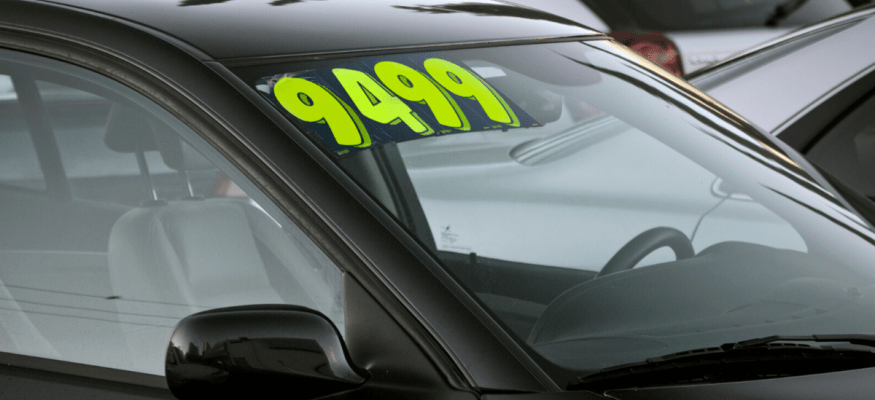Rules for Buying a Cheap Car With Cash
Look for Cars That Have ‘Uglied Out
peeling paint and hail damage are all your friends when buying a used car. The more scuffed up the exterior looks, the more you can haggle the seller down on price. Remember, exterior flaws won’t impact what’s under the hood.
Follow the 10 years/100,000 Miles Rule
Ever heard Korean and Japanese manufacturers like Hyundai, Kia and Mitsubishi advertising their 10 year/100,000 mile auto warranties?
That’s the inspiration for a different rule you should follow if you only want to drop two or three Gs to buy a used car: Look for cars that are 10 model years old and have at least 100,000 miles on them. Think 100,000 miles is too much and that a car with that many miles is probably near the end of its useful life? Think again
Know Where to Look for Deals
When searching for cheap used cars online, check Craigslist, AutoTrader, iSeeCars, the Klipnik message boards and CarGurus. The latter site lets you put in your zip code and the make/model of the vehicle you’re interested in at their website. They’ll comb through some two million listings available on published databases and rate the vehicles available for sale with notations of ‘good deal,’ ‘fair deal,’ ‘high priced,’ ‘overpriced’ and so on.
Beware Those Beloved Nameplates
Honda and Toyota pretty routinely top the tally for car reliability that Consumer Reports does, which means there’s a premium on their resale value. If you’re looking to buy a cheap car, skip the Hondas and the Toyotas of the world. USA TODAY recommends you instead look at what are called ‘second-tier’ Japanese brands like Mazda, Nissan or Mitsubishi.

Buying a car: Things to know
Get financing:
When you go to a car dealership, you’re in a stronger position if you have a pre-approved loan. Unless your model has a special low-rate financing offer backed by the manufacturer, a local bank or credit union is likely to give you a better deal on a loan. And in most cases, you can take a rebate in place of any low-rate financing and use that to lower your purchase price.
usually is good for a month or more.
Credit unions typically charge 0.5% to 1% lower interest than bank car loans. You may have access to a credit union where you work, or may be eligible through a professional organization (teachers, government employees). If you don’t have ready access to a credit union, check out your local bank offerings. Websites specializing in loan information will give you a quick rundown on average rates and the best rates in your area.
Negotiate a price:
Before you head for the dealership, do your homework. Using websites like Edmunds.com or Kelley Blue Book, you can find out the manufacturer’s suggested retail price, or MSRP, and the dealer’s cost for any vehicle. You can also find out about customer or dealer rebates, subsidized lease deals, or other special breaks that can cut your cost. Pull together a folder showing your data and sources.
Focus any negotiation on that dealer cost. For an average car, 2% above the dealer’s invoice price is a reasonably good deal. A hot-selling car may have little room for negotiation, while you may be able to go even lower with a slow-selling model.
Salespeople will usually try to negotiate based on the MSRP. Try to focus the discussion away from the list price, to how much you intend to bid over the dealer’s invoice cost. Bring out your research. The salesperson may know less than you do since traditional dealer training focuses on the list price and many dealers do not give sales teams the invoice prices.
Buying a New Car vs Buying a Used Car
When it comes time to buy a car, you have a variety of choices available to you. Not only do you need to pick the make and model of your car, you also need to decide if you want to buy a new or used car. This is an important decision and it can make a big difference in your finances over the next several years. It is important to realize that buying a car is not an investment Your options may also be determined on whether or not you qualify for a loan or if you need pay in cash.
Advantages of a New Car
The advantage of buying a new car is that you are buying a car that generally comes with a warranty. Most new cars will have very few repairs in the first few years, so you can focus only on the maintenance of the car. The dealer may also offer financing at a lower interest rate, which can reduce the amount of interest you pay over the life of the loan. These are the most basic advantages.
Disadvantages of a New Car
The biggest disadvantage of buying a new car is that you lose money on it as soon as you drive it off the lot. A new car takes its biggest depreciation in the first two or three years. This means that you are basically throwing away several thousand dollars that you will never be able to get back. Financially it does not make a lot of sense to buy a new car unless you have money you do not mind losing.
Advantages of a Used Car
The biggest advantage of buying a used car is that you let someone else take the biggest depreciation hit on the car. You may be able to sell your car for nearly the same amount you paid for it in the next few years. You can still find good financing options through your local bank or credit union, and because you are not losing the money on depreciation, you may come out ahead of a zero interest loan that you would take out on a new car.
Disadvantages of a Used Car
The biggest disadvantage of buying a used car is that it may not be as reliable or you may need to do more repairs on it. However, you do have the option of buying a Certified Pre-Owned car through several different car companies. As technology has improved cars have become more reliable and many models do not need repairs until they are well over 100,000 miles and close to ten years old. This means that you can buy a car that is three years old and sell it in five years and you may not need to do any major repairs on it. Plus, you can sell it at a price very close to what you bought it for. You may want to set aside a little bit of money each month to cover any car repairs that come up.
Who Has the Best Interest Rates: The Dealer or the Bank?
If you’re searching for a new or used car, chances are good that you’re planning on financing. The vast majority of new cars are financed, as the majority of drivers can’t afford — or don’t want — to pay for a new vehicle with cash. But before you sign the papers at the dealership, you might want to consider if you can get better interest rates and lower your payment by financing your next car through a bank or credit union
Who Offers a Lower Rate?
As a rule, there’s no telling whether the dealer will beat your bank’s rate, or vice versa. Remember: In most cases, dealer financing is also bank financing; the dealer is just doing the legwork by going to the bank on your behalf. So there’s no magic answer to the question of which one will have lower rates. That said, there are some pros and cons to choosing a dealer, and other pros and cons to choosing a bank. We’ve listed them to help you make the best decision possible
Dealer Financing: The Best Choice?
Many shoppers avoid the bank and just go through the dealer. It’s easier: They can show up, finance the car and drive away — all in the same day. But easier isn’t always better. After all, the dealer’s rates are marked up from the bank’s rates, and they have to be for the dealer to make any money. That means they may be higher. And since dealers send business to banks across the country, being late on a payment may mean talking to a bank located across the country — and they may not be willing to work with you, as your local bank might
Benefits of Your Bank
The bank holds a few benefits over the dealer. One is that the bank is nearby and you have a relationship. That means you have a better chance of getting the bank to work with you if you fall behind in your payments. That’s especially true if you finance through a small credit union or a local bank.
Our Suggestion
If you’re looking for your car, try this: Go to your bank first and see what their offer will be. Then visit the dealer. If they can match the bank’s rate, that’s great. If not, stick with the bank. Either way, you’ll have a great bargaining chip as you negotiate the car’s price.

Buying and running a car
Before you buy the car of your dreams, make sure you can afford all the costs. Learn about one-off and ongoing expenses, how to avoid sales pressure and get the best deal.
Costs of running a car
Before you buy a car, work out how much it costs to keep it on the road. It might be more than you think.
Car registration
Your car has to be registered before you can drive it, and you have to pay rego every year. How much you pay depends on where you live
Stamp duty
You have to pay stamp duty when you buy a new or used car. Each state and territory calculates stamp duty differently, so what you pay depends on where you live.
Insurance
You need basic insurance, called compulsory third party (CTP) insurance, to keep your car on the road. This is the minimum insurance you can have. You can also choose to get more third party or comprehensive insurance.